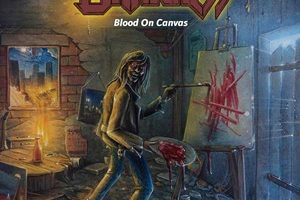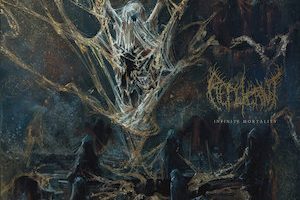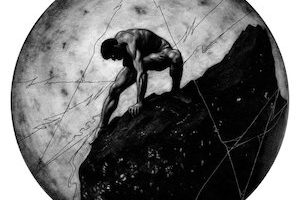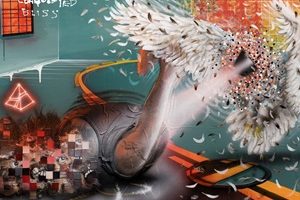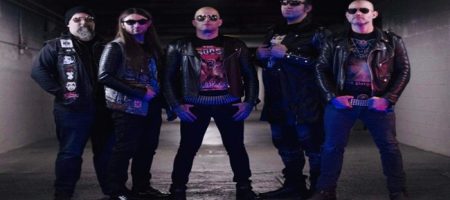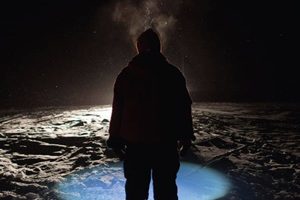Legion of the Damned – Strike of the Chalice
Sunday, 4th June 2023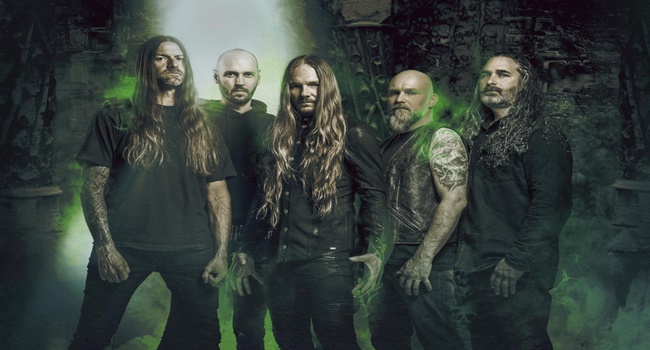
Sinister brutality lays present in Dutch death/thrash act Legion of the Damned. Originating as Occult from 1992-2005, they’ve released seven studio albums now under the LotD moniker – not losing one iota of savage attack in terms of their style, songwriting, or performances. The latest album The Poison Chalice sees the lineup expand to a five-piece, allowing the newly installed twin-guitar assault to obliterate in an even stronger manner than every before. We reached out to guitarist Fabian Verweij and vocalist Maurice Swinkels to learn more behind the making of the new record, special aspects that make an ideal song for the group, special moments playing in foreign countries, lengthy discussion on why they’ve never played North America to date, plus future live performance plans.
Dead Rhetoric: The latest studio album is The Poison Chalice – the first in the band’s career performing as a five-piece with a twin guitar assault. Where do you see this record sitting in the band’s discography – and were there any differences in approach, songwriting, or production compared to the previous record from 2019 Slaves of the Shadow Realm?
Fabian Verweij: When you are performing as a five-piece you can add more layers, and that was the intention with this album. To expand the boundaries, more style, more melodies, more solos – some solo battles. We really wanted to push those limits to widen our horizons. That worked out really well. We have to wait for the reaction. The production was also different, in another studio with another producer so that was all different. Maurice can tell you about how it was usually done. We knew the new producer could get us close to the sound achieved by bands like At the Gates or Slayer, we knew he was capable of doing it. We got along easily to get the right sound for the guitars, and he had a great drum kit, and wanted to approach the live sound of it. He wanted the pounding metal to burst out of the speakers, and he succeeded. We are really happy with it.
Maurice Swinkels: The other record was recorded with Andy Classen. The difference for me as a vocalist is we always had limited time, say like two – three weeks including the mixing. It’s always being in the studio against a deadline. My singing usually has to be done in two or three days. With Erwin (Hermsen), he’s also a friend of ours who lives close by, so I could go there and do one or two songs max, go home for a week, and come back for more songs. We took things a little easier. We had to trust everyone this time, because everyone did their parts on their own. I don’t write the lyrics myself; I get them delivered at the last moment. They never know where they are going to go, or where my voice is going to be. We really have to trust each other. Solo-wise, melody-wise, I had to trust them, so they had to trust me that it was going to work out for the vocals. That’s a completely different thing than we did to any other album. Usually with mixing we are together with Andy Classen, going through the mix and talking about it. Now it was Erwin doing it on his own, sending us the link, and everybody listening to it on their own at home. You can listen at home, in the car, and get some comments together.
Dead Rhetoric: Do you think the pandemic also helped as far as drilling down into the details and giving the band enough time to get comfortable with the songwriting?
Verweij: I think so. We didn’t have so many shows during the pandemic. We had more time to write music. There was no deadline, we could work on every song like one hundred times. We took the time that was needed. Some songs are written in one session, some songs are written in two or three sessions. We could take the time that was needed to make the most out of it. We are satisfied, we didn’t have the problem of recording it and thinking maybe we could have tried a different part. We are prepared at our maximum.
Dead Rhetoric: Considering the band combines elements of thrash, death, and blackened angles in your style, are there certain trademark elements that have to be there to make the final grade for a Legion of the Damned song this deep in the band’s career?
Swinkels: That’s a good question. For me I always hammer on them, make sure it’s Legion of the Damned – but that’s a good point, what is Legion of the Damned? If you go back to the first albums we did as Legion of the Damned, Malevolent Rapture and Sons of the Jackal, it’s the banging riffs. I think that should always be there, recognizable as a typical Legion of the Damned riff. And then from there you can add some black metal, melodic or a Judas Priest type of thing, there should always be some sort of speed aspect for banging, personally I think that should be there.
Verweij: Some other special aspects are Erik’s way of drumming. He is easily recognizable, and he did a great job this time because the songs are a little different than before. When he starts drumming, he gives it the Legion of the Damned trademark. And the singing, both members give this more of our own style. For the band there is a lot of room to do new things, but with those aspects they make it Legion of the Damned.
Dead Rhetoric: When it comes to the solos and rhythm parts, are there specific aspects you are better at Fabian than Twan – and how would you describe your styles?
Verweij: I think Twan is really good at composing. He’s really good at breaking down riffs. Sometimes you will have a simplified version of the riff, and he says trust him for it to work. I bring some more melody, more dynamics, variation of layers. I can make it like a story on its own. When we work together, it’s very easy to find each other. He pushes me, and I push him. Together I think we are a great force.
Dead Rhetoric: Do you each have a favorite song or two from the new album you’d like to talk about?
Verweij: Every song, actually (laughs). Well, “Beheading of the Godhead”, is the first track we got in the mix, we were blown away by it. It’s not a typical Legion of the Damned song. And “Progressive Destructor” is also one of our favorites.
Dead Rhetoric: How did the process work for the cover art this time – and where do you see the importance of this medium in metal to portray the right impression for the listeners before pressing play?
Swinkels: Yes, it’s the first thing that you see. We have worked with an artist for many years. There are so many great artists, you need something that is recognizable, stands out and is right. You also need a budget for it. For this album, we had the same designer as the Slaves album Gyula. We were thinking about other designers, but I liked working with him. We also had a different guy working on the lyrics for us, he made the storyline for the album. Sometimes we have three designers work on an album cover and decide the best one out of that. I’m really happy with this.
Dead Rhetoric: What were some of the lyric topics tackled this around? Do you enjoy the challenge of taking other people’s lyrics and interpreting them with your vocals/melodies?
Swinkels: I used to do the lyrics for the band Occult prior to us becoming Legion of the Damned for many years. I’ve found I can be good in English but not in crafting with good lyrics, I found them to be a little childish. So, I asked a good friend of mine to listen to the songs, and have somebody out of the band to do the lyrics and think, what would he do with a song like this? The first songs he did were for Feel the Blade, and we were amazed. The lyrics were a singalong, they stick into your head and tell a story. He enjoyed it, because he reads a lot but doesn’t write books, so it was something for him to write things down. I told him about the topics I want to sing about: World War II, serial killers, etc. I wanted to give him freedom from there to decide the topics he wanted to cover. Because he is not a singer, it’s always a collaboration between him and I, go over the lyrics, change things. Most of the time he hears the song when it’s recorded, and he always says it’s not how he intended at first, but it works like that. I give my own twist to it.
Sometimes the lyrics are so easy to interpret, I know exactly what he means to say on the first try. That’s always fun to do. I always say, don’t change a winning team.
Dead Rhetoric: When looking at the vast career of Legion of the Damned, have there been any significant standout moments to you when you knew you were making a move up the ranks or an impact with your craft? Be it specific albums, shows, tours, or festival appearances?
Swinkels: We’ve done many great things. If you look at festivals, those things are great. You can talk about the things that stick in your mind – for instance the first time we played Wacken on the main stage. We have played in Lebanon, and we have played Dubai, Bangkok, Vietnam, Mexico with Exodus. Going back to our days in Occult, we toured with Nuclear Assault, all these bands that don’t even exist anymore. Those stand out for me personally. Everything you do – even if it’s a small festival, if the crowd is going crazy, that’s good.
Verweij: The festival runs are really cool. I enjoyed the tour with Destruction, there are so many highlights and bucket list shows since joining now. I’m really happy with it.
Dead Rhetoric: What do you see as some of the biggest challenges Legion of the Damned faces this deep into your career? Is it a balancing act between musical duties and personal responsibilities with families, relationships, etc.?
Verweij: That’s the balance that we all are searching for. We all know what the band needs but we also have jobs, children, wives, and girlfriends. It’s a challenge when you are a five-piece, everyone has their priorities. It’s hard to find the same common ground on it.
Dead Rhetoric: How do you compare what people get from the band on record versus hearing/seeing the band live? Do you enjoy one aspect more than the other – or are both equally exciting for their own reasons?
Verweij: I think both are equally exciting for the same reasons. I am looking forward to the reactions of the new album, we enjoyed writing and recording it, every step of the way. But I cannot wait to play it live, what it actually does.
Swinkels: For myself, I’m not a fan of going into the studio. It has to do with getting nervous before going into the studio, can I deliver? If I can still deliver with my voice, I feel my voice is not as strong as it was live say in 2005 or 2007, it was very powerful. You can lose that voice over the years, so I get nervous going into the studio if I can deliver. When you can deliver, you feel better about it. It’s a muscle, so it can be stressful. I’m always happy when an album is done and going into the mixing stages. I prefer playing live.
Dead Rhetoric: What worries or concerns do you have regarding the world that we live in today? What do you think the average person needs to think about and work on to make the world a better, safer place overall?
Verweij: Those are big questions! (laughs) I think it’s important to respect yourself and one another.
Swinkels: Everybody gets easily aggravated at each other. I see it all around me. They are quick to anger quickly, online people don’t have respect, people always complaining. We notice it even when we were in Occult, there was a lot of jealousy. I wish that it was different. That’s something I wish was better.
Verweij: Maybe also to hang out more and leave the social media for what it is. People at gigs and they are sitting in a circle on their phones, liking and subscribing to things instead of drinking beers and having fun.
Dead Rhetoric: Considering your lengthy career as a band, there have been certain territories you’ve yet to play in live – especially surprising would be North America. Have you had offers from the USA/Canada, and what circumstances would have to take place to get a tour or festival appearance going on for this area of the world?
Swinkels: It’s a weird thing, because we have been doing Legion of the Damned since 2005, now over 18 years we have not had one offer from the USA. We have a lot of fans on Facebook who tell me, when will we play there. Some fans start to believe that we hate the US because we haven’t come there. It’s impossible, you need a promoter to invite you. I’m always sending emails to the Maryland Deathfest, all these other festivals, no response. I had one festival in Canada, their interested, they wanted to know when we were coming to the US and they would make an offer. It’s expensive without a tour.
In Europe it’s the other way around. You have fans that like your albums and you are able to go on tour. In the US, you get fans when you are touring. How do you get to them when there is no promoter showing interest? It’s a different market, and really hard. You can’t do one show in the US, it has to make sense to get there for three-four weeks. Doing it on your own is expensive, you have to do this with a bigger band. It’s really hard, and it still amazes me as we have played in Europe with the biggest bands: Kreator, Celtic Frost, Sepultura, and we never get an offer from the US. That’s really bizarre to me. We are even willing to play our own flights. We would love to play there. That’s why we need guys like you who can help support us in the US.
Dead Rhetoric: What’s on the agenda for Legion of the Damned activities over the rest of 2023 into 2024?
Swinkels: On the 27th of May we will have an album release show at the Rock Hard Festival. A new setlist, we have 16 festivals in Europe during the summer – Wacken, Summer Breeze, Masters of Rock, all these festivals. We will see what’s in store for us going into 2024, hopefully some touring in the US.
Legion of the Damned on Facebook











